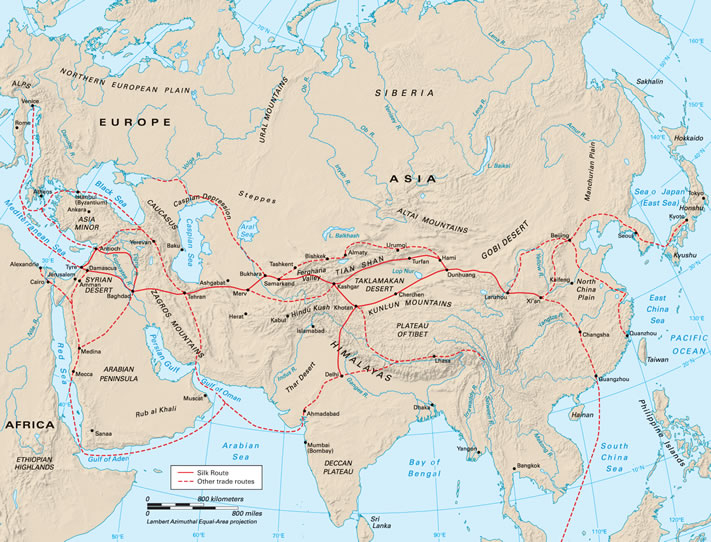
ENCOUNTER ON THE SILK ROAD
Our minivan turned away from the Heavenly Mountains, rising red and naked out of the barren steppe, into Xinjiang’s Kyzyl valley, a desiccated otherworldly domain for ascetics. Our purpose was to visit the Buddhist caves and their ancient frescoes. A tentative branch of the Tarim River gave life to a blanket of vegetation on the valley floor, wide enough to wrap a small community in. We stopped there for a short break.
After a few minutes, our guide told us that one of the locals asked her if we would give him and his wife and son a lift to Kucha, which was the next town along the Silk Road we planned to visit. Recently an accident had severed their ten-year-old son’s finger and he needed urgent medical care unavailable where they lived. Kucha, an hour’s drive away, had facilities. Of course we agreed, and the little family installed themselves in the back of the minivan.
They were Uighurs, Turkic – speaking people who migrated to Xinjiang in the 9thcentury CE, supplanting Indo-European Tocharians. A nomadic horse-riding people of impressive skill, centaurs of the steppes, many became officers in Genghis Khan’s army. Now they are Muslims, and unloved by the Chinese.
The calm demeanor of the boy, who had not been given any painkillers, fascinated me. He sat there quietly, as if he had swallowed silence, diligently holding his separated finger wrapped in a blood- stained bandage. No movement stirred him, not even to look at the beauty of the mountains to our left as we drove east along the famous Silk Road, mercifully smooth and straight now, a product of the massive Chinese infrastructure investment that has driven GDP growth to such heights. No tears disturbed the composure of his face, nor any appeal to his mother who was sitting beside him. While, undoubtedly supportive, she allowed him the space his determination required.
But he must have been in extreme pain and wracked with worry about whether the surgeon he was to see could sew his finger back on. Would he or she have the skill? Would he get there in time? What would it be like to have an incomplete hand forever? However the only concession to such anxieties was a hint of concentration observable in his stony face.
There was hope lurking in that unmovable expression; there must have been or he wouldn’t be in the minivan going to Kucha. I was moved by the pathos of seeing that sad little boy looking after his finger, keeping it warm, trusting above all anxiety in the ability of the medical profession to make things right. I couldn’t help thinking about the chances of whether there would be the required expertise in this remote place. Regrettably we were never to find out. After dropping the family off at the hospital our guide suggested we continue our journey without waiting.
How to deal with pain has occupied philosophy and its predecessors in thought since before time. Out there in the cruel steppe, pitiless weather and ferocious warfare over the centuries have inured its people to the need.
I doubt whether the family had ever heard of Stoicism, but the Stoics, whose philosophy spread from Greece to animate the Roman civilization, and others in the West up to ours until recently, would clearly have recognized their thinking in the boy’s behavior.
The case put me in mind of Epictetus, the Greek slave in Rome who was such a prominent Stoic philosopher, influencing people as powerful as Emperor Marcus Aurelius. His cruel master, who had been a slave himself and was now a wealthy freedman, punished him for some misdemeanor by having his leg twisted. With unruffled composure Epictetus mentioned calmly, “if you continue to do that you will break my leg.†The master persisted with the twist and the leg broke. In a matter of fact voice, Epictetus said, “There, did I not tell you it would break?â€
Epictetus, who held that, “Not things but opinions about things trouble menâ€, was able to endure the pain by mentally externalizing its presence in a manner that decoupled it from emotion linked to opinion about its existence, thereby reducing its severity.
Without knowing it, the little boy of the steppe must have done something like that.
Tony Grey